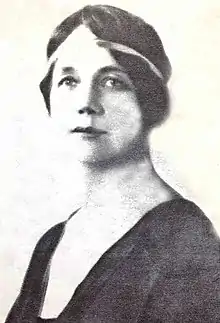Ruth White (Baháʼí author)
Ruth White was an American author who was a member of the Baháʼí Faith, until she was designated a Covenant-breaker. She became widely known as an American Baháʼí who rigorously challenged the Will and Testament of ʻAbdu'l-Bahá, one of the founding documents behind the Baháʼí administration.
Ruth White | |
|---|---|
 | |
| Born | November 20, 1867 Brooklyn |
She met ʻAbdu'l-Bahá in America in 1912. She also performed Baháʼí pilgrimage in 1922.[1]
Will and Testament of ʻAbdu'l-Bahá
The Will and Testament was written in three parts and covers a wide range of topics. It reiterates some of the fundamental teachings of the Baháʼí Faith, clearly calls out Mírzá Muhammad ʻAlí as being a Covenant-breaker, establishes a new institution of the Guardian and clarifies its roles as compared to those of the Universal House of Justice, and also defines the responsibilities of the Hands of the Cause.
Opposition
White was a veteran of the American Baháʼí community, having even visited ʻAbdu'l-Bahá in Palestine in 1920, just a year before his passing.
She challenged the appointment of Shogi Effendi as the successor of ʻAbdu'l-Bahá. Her claim was based in part on her belief that ʻAbdu'l-Bahá would never advocate for a hierarchy, much less the establishment of a "papacy".[2][3]
In particular, White challenged the idea of having Spiritual Assemblies and the appointment of Shoghi Effendi as the first Guardian, spending decades trying to stop him from assuming a position of leadership over American Baháʼís.[4][5] During her time of opposition, White wrote several letters to the National Spiritual Assembly of the Baháʼís of the United States and Canada objecting to Shoghi Effendi and the idea of Spiritual Assemblies. She wrote a letter to the United States Postmaster General requesting that the National Spiritual Assembly not be allowed to use the mail system, and she also wrote to the High Commissioners for Palestine with complaints about Shoghi Effendi. White hired a criminologist Charles Ainsworth Mitchell to review photocopies of the original Will and Testament of ʻAbdu'l-Bahá, which she received from the National Spiritual Assembly. The photocopies were compared to other notes White had gathered of ʻAbdu'l-Bahá's handwriting. Mitchell's provisional report indicated that the Will was a forgery, pending inspection of the originals.[6][7] White placed Mitchell's signed report with the U.S. Library of Congress in 1930.[8]
Neither White nor Mitchell could read Persian, and her claims of a forgery were not taken up by many other Baháʼís opposed to Shoghi Effendi, such as Ahmad Sohrab. White was one amongst a small group of Baháʼí to question the authenticity of ʻAbdu'l-Bahá's Will.[9][10][11] White was designated a Covenant-breaker by Shoghi Effendi, and was excommunicated sometime after 1926 when the extent of her opposition became clear.
Works
- ʻAbdu'l-Bahá and the Promised Age, 1927, Appendix, 1929 entitled Is the Baháʼí Organization the Enemy of the Baháʼí Religion?. New York: J.J. Little and Ives Co., January 1929.
- ʻAbdu'l-Bahá's Alleged Will is Fraudulent, 1930.
- Correspondence Between the High Commissioner of Palestine and Ruth White, Concerning the Alleged Will and Testament of Sir ʻAbdul-Bahá ʻAbbas . 11. Los Angeles, Calif. : White, 1932.
- Baháʼí Leads out of the Labyrinth. New York: Universal Publishing Company, 132 E 65th Street, New York, 1944. Digitally republished, East Lansing, Mi.: H-Bahai, 2004.
- ʻAbdu'l-Bahá's Questioned Will and Testament. Beverly Hills: Ruth White, 1946. Digitally republished, East Lansing, Mi.: H-Bahai, 2004.
Further reading
- Baha'is in Exile, An Account of Followers of Baha'u'llah Outside the Mainstream Baha'i Religion by Vernon Elvin Johnson.[12]
- The Universal Principles of the Reform Bahai Faith, edited by Frederick Glaysher[13]
See also
References
- "All documents tagged "Ruth White"". bahai-library.com. Retrieved 2020-10-28.
- White, Ruth (1946). Abdul Baha's Questioned Will and Testament. Beverly Hills, California, USA: J.J. Little and Ives Company.
- White, Ruth (1929). Is the Bahai Organization the Enemy of the Bahai Religion?. New York City, USA: J.J. Little and Ives Company.
- White, Ruth (1946). Abdul Baha's Questioned Will and Testament. Beverly Hills, California, USA: J.J. Little and Ives Company.
- White, Ruth (1929). Is the Bahai Organization the Enemy of the Bahai Religion?. New York City, USA: J.J. Little and Ives Company.
- Momen, Moojan. Studies in Honor of the Late Hasan M. Balyuzi. Vol. 5. Kalimát Press, 1988. p273-274
- http://freebahais.org/early-bahais/ruth-white/
- Bahais. "Dr. C. (Charles) Ainsworth Mitchell, Report on the Writing Shown on the Photographs of the Alleged Will of Abdu'l-Baha, Library of Congress, 1930, Ruth White".
- Taherzadeh, Adib (1972). The Covenant of Baháʼu'lláh. Oxford, UK: George Ronald. p. 347. ISBN 0-85398-344-5.
- Taherzadeh, Adib (2000). The Child of the Covenant. Oxford, UK: George Ronald. pp. 299–300. ISBN 0-85398-439-5.
- Rabbani, Ruhiyyih (1948). Twenty-Five Years of the Guardianship. Wilmette, Illinois, USA: Baháʼí Publishing Trust. p. 21.
- Ph.D, Vernon Elvin Johnson (2020-01-16). Baha'is in Exile: An Account of Followers of Baha' U' llah Outside the Mainstream Baha'I Religion. Dorrance Publishing. ISBN 978-1-64530-574-3.
- Baháʼuʼlláh, 1817-1892. (2008). The universal principles of the reform Bahai faith. Glaysher, Frederick, 1954-. Rochester, MI: Reform Bahai Press. ISBN 978-0-9670421-0-7. OCLC 212409912.